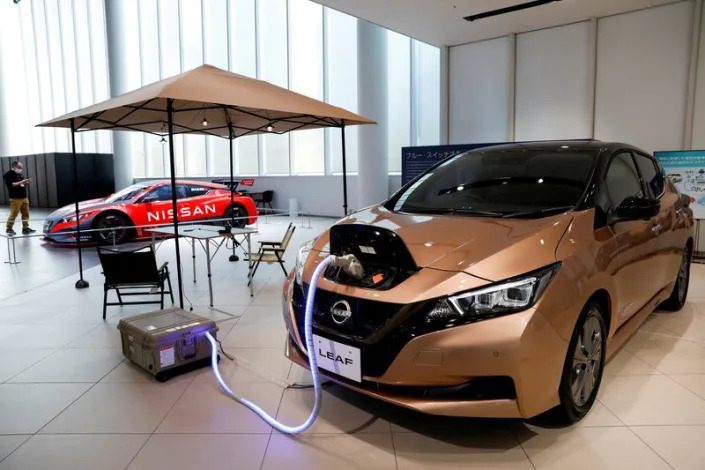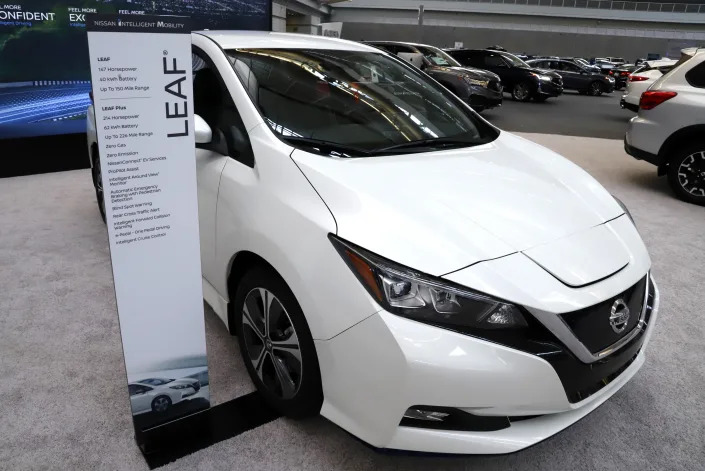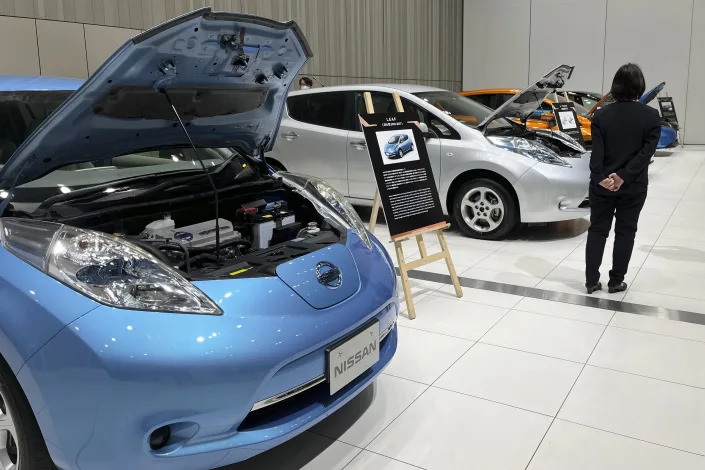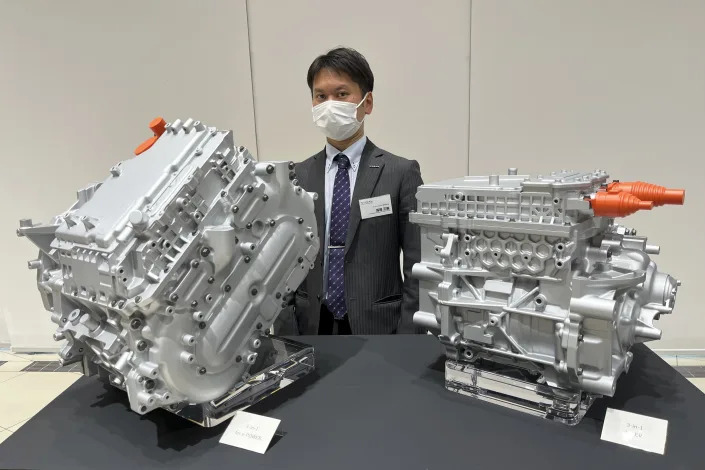
A Nissan Leaf EV car and portable battery on display at Nissan Gallery in Yokohama
Wed, March 8, 2023
YOKOHAMA, Japan (Reuters) - Nissan Motor Co Ltd on Thursday said it will overhaul its approach to powertrains for all-electric and hybrid petrol-electric vehicles as it aims to bring hybrid prices in line with those of petrol-powered cars by 2026.
The Japanese automaker said it will use the same components across models to make electric powertrains - the assembly which propels a vehicle - smaller and lighter, and reduce development and production costs by 30% within three years versus 2019.
It will also use solid-state batteries with materials that are cheaper than those usually used, such as nickel and cobalt, Senior Vice President Toshihiro Hirai told reporters.
"Materials that don't use such expensive precious metals are being developed, which will be a major factor in reducing costs," Hirai said.
The effort is among many by automakers trying to make new-energy vehicles more affordable, such as by reducing the cost of electric powertrains which have yet to achieve parity with those used in traditionally powered vehicles.
Nissan will apply its streamlined approach to powertrains to different sizes of vehicles, expecting to equip such vehicles as micro "kei" and mid-sized cars from 2024 or 2025, Hirai said.
The powertrain size and weight reduction will improve vehicle performance, such as by making driving in the snow or on sand more stable, the automaker said.
Nissan became one of the first mass-market electric-vehicle makers with its Leaf model more than a decade ago. It aims to introduce 27 electrified models, including 19 all-electric vehicles, by fiscal year 2030.
Japan's Nissan slashing EV costs, cuts rare materials use




Nissan Chief Executive Makoto Uchida speaks during a Renault Nissan Mitsubishi press conference in London, on Feb. 6, 2023. Nissan is speeding up its shift toward electric vehicles, especially in Europe where emissions regulations are most stringent, the company said Monday, Feb. 27, 2023. (AP Photo/Kirsty Wigglesworth, File)
YURI KAGEYAMA
Wed, March 8, 2023
TOKYO (AP) — Japanese automaker Nissan is revving up its electrification shift and slashing costs by using the same components across models and reducing use of expensive rare materials.
Nissan Motor Co. presented its “X-in-1” development strategy Thursday, in which the X stands for various powertrain parts such as an electric motor and inverter that can be used across models. The company said development and manufacturing costs will be reduced by 30% in 2026 compared to 2019 levels.
The Yokohama-based automaker was a pioneer in electric vehicles but rivals like Tesla and BYD of China have overtaken it.
As the move toward ecological models gains momentum around the world, driven by worries over climate change, Nissan has been eager to showcase its prowess.
Its senior vice president, Toshihiro Hirai, acknowledged that prices of rare earths and other materials needed to make electric vehicle batteries and other parts are expected to rise in coming years. That means automakers must have a solid strategy for obtaining raw materials if they hope to succeed in electrification.
“We make the most of our expertise and know-how from our more than a decadelong development and production of electrified technologies,” said Hirai.
Compared to the first-generation vehicle the Leaf, rare materials account for 25% of the weight of the 2019 Nissan Note EV. Nissan aims to make that 1% or less.
Nissan, which also makes the March subcompact and Infiniti luxury models, is working on solid-state battery technology for EVs, a move that if successful is expected to radically reduce costs.
By 2030, Nissan’s EV offerings will cost about the same at dealers as the equivalent regular gasoline-engine models, Hirai said.
The cheapest EVs like the Leaf now sell for under $30,000, although small internal-combustion engine cars are cheaper, at about $21,000 for the Nissan Sentra in the U.S.
A Tesla Model 3, a relatively affordable model for a Tesla, sells for about $43,000.
But EVs are usually eligible for tax credits and other incentives. High gasoline prices might make EVs a smart buy in the long run, although much depends on the owner’s driving habits.
A Consumer Reports analysis last year said that based on the gas price at that time of $4.31 a gallon, EV owners could save between $1,800 and $2,600 in operating and maintenance costs for every 15,000 miles they drive, compared to drivers of gas-powered vehicles.
That's the average distance newer vehicles are driven in a year in the U.S. Gas prices have since fallen, so the savings would be lower but still significant.
Hirai said people find driving an electric vehicle less stressful because it’s quiet and delivers a smooth ride, even over rough terrain, while maintaining the fun feel of driving. One advantage of an EV is its more precise control over each wheel, which can effectively counter bumps and jolts.
Nissan has promised 27 new electrified models, including eight e-Power “series hybrid” models, which have both a gas engine and electric motor, by fiscal 2030.
___
Yuri Kageyama is on Twitter https://twitter.com/yurikageyama
Find more AP coverage of technology at https://apnews.com/hub/technology
No comments:
Post a Comment